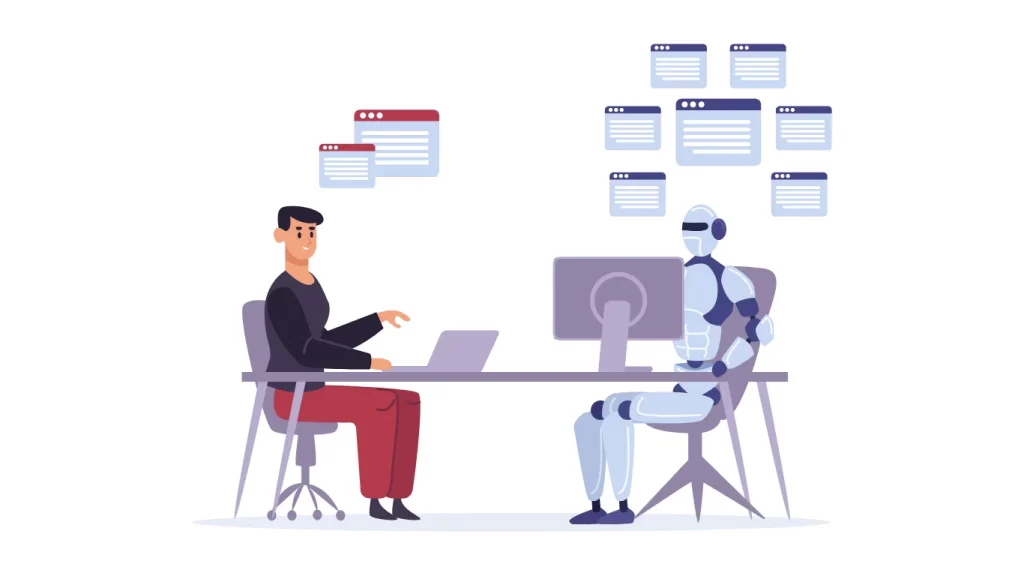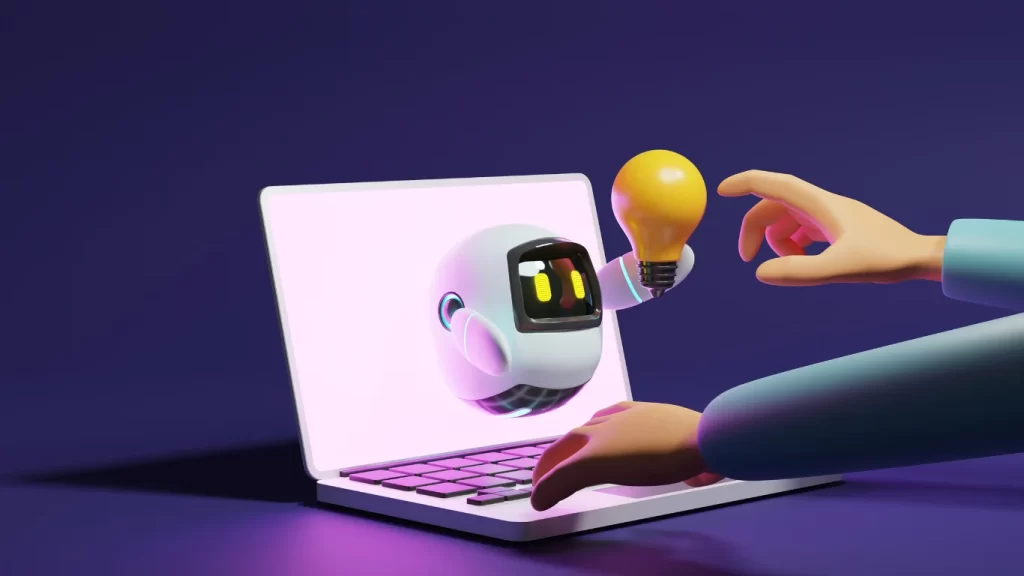Artificial Intelligence (AI) is transforming various industries, and one of the areas where it’s making a significant impact is human resources (HR). With its ability to streamline work processes, mitigate biases, and enhance decision-making, the question arises: can AI replace human resources? The integration of AI within HR departments has accelerated notably during the COVID-19 pandemic, highlighting the technology’s potential to navigate and address the challenges posed by such unprecedented times. Moreover, with a significant investment boost in AI technologies, as reported by 81% of companies, the impact of AI on HR practices is becoming increasingly profound.
As the journey towards an AI-integrated future in HR unfolds, it’s paramount to explore not just the benefits but also the challenges and limitations of replacing human elements with generative AI. This article aims to help you understand whether AI can indeed take over human resources. By examining the current state of AI in HR, its advantages, and the critical role of human judgment, alongside preparing for a future where AI technologies are omnipresent within HR departments, we delve deep into understanding the transformation AI is bringing to the field of human capital management.
Can AI replace human resources?

At the moment, Artificial Intelligence (AI) in Human Resources (HR) is transformative, reshaping how HR departments operate across various functions. Here’s a closer look at the integration of AI in HR:
- Adoption and Predictions:
- A staggering 92% of HR leaders are already leveraging AI in some capacity within their departments, with intentions to expand its use.
- By 2024, it’s anticipated that 80% of large organizations will employ AI/ML-enabled “managers” for tasks like hiring and training.
- Impact on HR Functions:
- AI applications span across employee records management (78%), payroll and benefits (77%), recruitment (73%), performance management (72%), and onboarding (69%).
- Genesis10 exemplifies AI’s utility in HR through automated resume screening, predictive analytics for candidate matching, and AI-driven chatbots.
- Future Expectations:
- The urgency to adopt AI in HR is apparent, with 76% of HR leaders believing that failure to integrate AI within 12 to 24 months could hinder their company’s success.
- AI’s role extends to automating administrative tasks, enhancing performance reviews, customizing training programs, and improving recruitment processes, promising a future where HR departments are more efficient, cost-effective, and data-driven.
Benefits of AI in HR
The integration of AI in HR departments has brought forth a new era of efficiency and innovation. Here are some of the key benefits:
- Improved Efficiency and Cost Reduction:
- AI automates routine tasks such as payroll management, benefits administration, and leave tracking, significantly reducing the likelihood of errors.
- By automating these tasks, HR professionals can focus on strategic initiatives, saving both time and money.
- Enhanced Decision-Making and Reduced Bias:
- AI-driven tools analyze vast datasets to provide actionable insights, helping HR professionals make informed, objective, and timely decisions.
- These tools can also help eliminate unconscious bias in recruitment and performance management, leading to a more diverse and inclusive workforce.
- Personalized Employee Experience:
- AI offers personalized training content and analyzes individual skill gaps, leading to more effective learning.
- Identifying employees who may leave a company can be done through predictive analytics. This allows for focused retention strategies to be implemented, leading to an increase in overall employee satisfaction levels.
By leveraging AI, HR departments can not only streamline their operations but also foster a more engaging and equitable workplace.
Challenges and Limitations of AI in HR

While AI in HR brings numerous benefits, it also faces several challenges and limitations that cannot be overlooked:
- Human Judgment and Adaptability:
- AI systems struggle with reasoning and ethical considerations, which are effortlessly managed by human judgment.
- In unpredictable circumstances, humans outperform AI by adapting and making informed decisions through creative thinking.
- Emotional intelligence, crucial in fields like healthcare and arts, remains a domain where AI cannot truly understand or replicate human experiences.
- Data and Privacy Concerns:
- Data Privacy and Cybersecurity Risks: The adoption of AI tools necessitates vigilant consideration of data privacy and cybersecurity, cautioning against tools that claim to ‘do it all’.
- Compliance and Ethics: Navigating regulations like HIPAA, CCPA, and GDPR is essential to avoid financial penalties and reputational damage. HR teams must ensure data usage aligns with ethical boundaries and maintain transparency with employees.
- AI Implementation Challenges:
- Bias and Discrimination: AI algorithms can inadvertently introduce bias, potentially leading to unfair treatment of employees or candidates.
- Employee Displacement: Automation risks job loss, necessitating reskilling programs to help employees transition.
- Lack of Human Interaction: HR tasks requiring emotional intelligence, like conflict resolution, highlight the limitations of AI and automation in replicating human interaction.
Human Resources Tasks That AI Can Automate
Artificial Intelligence (AI) tools are revolutionizing Human Resources (HR) tasks, offering a wide array of applications to automate and enhance processes. Here’s a closer look at how AI is transforming HR tasks:
- Recruitment and Hiring:
- Job Ad Writing: AI tools like iHire’s Job Ad Builder optimize job ads to be SEO- and mobile-friendly, attracting a wider pool of candidates.
- Resume Screening: Platforms such as iHire’s Applicant iScore utilize AI to scan and shortlist resumes, ensuring only the most suitable candidates are considered.
- Interview Scheduling: Solutions like Sidekick Ai and Calendly automate scheduling by analyzing participants’ schedules and setting up interviews at convenient times.
- Employee Onboarding and Development:
- Automated Onboarding: AI platforms like BambooHR streamline the onboarding process, from verifying documents to providing company hardware and software access.
- Personalized Training: AI in learning and development customizes training to suit individual employee needs, enhancing skill acquisition and job satisfaction.
- Performance and Engagement Monitoring:
- Performance Management: Tools such as 15Five and Reflektive use AI to analyze performance data, offering actionable insights for improvements.
- Employee Engagement Surveys: Platforms like TINYpulse automatically collect and analyze feedback, aiding in the identification of areas for improvement.
Incorporating AI into HR tasks not only streamlines operations but also provides deeper insights into employee performance and engagement, paving the way for a more efficient and responsive HR department.
The Role of Human Judgment in HR

Human Resources (HR) relies on human judgment to interpret context and ambiguous information, which Artificial Intelligence (AI) cannot replicate with the same depth. HR professionals excel in areas like conflict resolution and employee relations, where emotional intelligence and ethical considerations are vital. However, we should recognize the potential drawbacks of human judgment:
- Common Biases Affecting HR Decisions:
- Confirmation Bias: Seeking information that supports one’s decisions while ignoring contradictions.
- Curse of Knowledge: Failing to consider the perspective of those with less understanding.
- False-Consensus Effect: Overestimating agreement with one’s proposals.
When making decisions, it’s important to use evidence-based practice. This means looking at evidence from different sources and using it to make balanced decisions. Creating a diverse and inclusive workplace is key, and addressing unconscious bias is an essential strategy. To achieve this, it is important to acknowledge and work against our unconscious biases.
- Interrupters: Implementing pause points during decision-making to reflect and assess biases.
- Awareness Training: Educating about cognitive biases and their impacts.
- Reevaluation of Processes: Adjusting recruitment and evaluation processes to minimize bias.
To create a productive work environment, it’s crucial to balance technology and human involvement. While AI can improve efficiency and offer valuable insights, it’s also important to consider ethical, empathetic, and contextually appropriate decision-making. HR leaders play a vital role in establishing a culture that encourages digital curiosity and trains employees to use technology effectively. This will help ensure that AI complements human judgment rather than replacing it.
Preparing for an AI-Integrated Future in HR

As the AI market is poised to reach a staggering $1 trillion in the U.S. by 2028, HR departments must strategically prepare for an AI-integrated future. The following steps are essential for a seamless transition:
- Define AI Objectives and Priorities:
- Identify challenges within HR functions that AI can address.
- Set measurable goals for AI integration, focusing on enhancing efficiency and decision-making.
- Use the important-urgent matrix to prioritize AI applications, ensuring immediate needs are addressed while planning for future integration.
- Research and Selection:
- Evaluate AI-powered HR tools for compatibility with existing systems, user-friendliness, data security, and cost-benefit analysis.
- Choose scalable, user-friendly AI solutions that align with HR objectives, ensuring they can adapt to future needs.
- Implementation and Training:
- Develop a phased implementation timeline, starting with a data needs assessment and privacy compliance, followed by HR training on AI tools.
- Conduct pilot testing to refine processes and monitor the integration closely for any necessary adjustments.
- Encourage continuous learning through resources like AIHR Academy, offering courses on People Analytics, Recruitment, Digital HR, and more to keep HR teams at the forefront of AI advancements.
HR departments can prepare for an AI-integrated future by leveraging technology while maintaining a human touch in HR practices.
Conclusion
In this analysis, we explore the integration of AI within HR departments. We look at the benefits of AI in streamlining operations and removing biases while also acknowledging the value of human insight and judgment. We discuss how AI can assist decision-making processes and improve efficiency while addressing challenges related to data privacy and emotional intelligence. By finding a balance between AI and human resources, we can create a future where technology and human understanding work together effectively.
To prepare for a future where AI is integrated into HR, it’s essential to maintain a personal touch. As we move closer to a reality where AI tools are used to support HR departments, we need to make a conscious effort to balance technology with ethics and genuine human connections. By using AI’s strengths and recognizing its limitations, HR can become a more effective, inclusive, and insightful domain. This will create a new era where technology and human insights work together to foster a dynamic and responsive human resources landscape.





